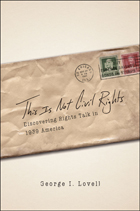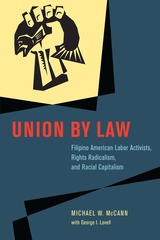2 books about Lovell, George I.

This Is Not Civil Rights
Discovering Rights Talk in 1939 America
George I. Lovell
University of Chicago Press, 2012
Since at least the time of Tocqueville, observers have noted that Americans draw on the language of rights when expressing dissatisfaction with political and social conditions. As the United States confronts a complicated set of twenty-first-century problems, that tradition continues, with Americans invoking symbolic events of the founding era to frame calls for change. Most observers have been critical of such “rights talk.” Scholars on the left worry that it limits the range of political demands to those that can be articulated as legally recognized rights, while conservatives fear that it creates unrealistic expectations of entitlement.
Drawing on a remarkable cache of Depression-era complaint letters written by ordinary Americans to the Justice Department, George I. Lovell challenges these common claims. Although the letters were written prior to the emergence of the modern civil rights movement—which most people assume is the origin of rights talk—many contain novel legal arguments, including expansive demands for new entitlements that went beyond what authorities had regarded as legitimate or required by law. Lovell demonstrates that rights talk is more malleable and less constraining than is generally believed. Americans, he shows, are capable of deploying idealized legal claims as a rhetorical tool for expressing their aspirations for a more just society while retaining a realistic understanding that the law often falls short of its own ideals.
[more]

Union by Law
Filipino American Labor Activists, Rights Radicalism, and Racial Capitalism
Michael W. McCann with George I. Lovell
University of Chicago Press, 2020
Starting in the early 1900s, many thousands of native Filipinos were conscripted as laborers in American West Coast agricultural fields and Alaska salmon canneries. There, they found themselves confined to exploitative low-wage jobs in racially segregated workplaces as well as subjected to vigilante violence and other forms of ethnic persecution. In time, though, Filipino workers formed political organizations and affiliated with labor unions to represent their interests and to advance their struggles for class, race, and gender-based social justice.
Union by Law analyzes the broader social and legal history of Filipino American workers’ rights-based struggles, culminating in the devastating landmark Supreme Court ruling, Wards Cove Packing Co. v. Atonio (1989). Organized chronologically, the book begins with the US invasion of the Philippines and the imposition of colonial rule at the dawn of the twentieth century. The narrative then follows the migration of Filipino workers to the United States, where they mobilized for many decades within and against the injustices of American racial capitalist empire that the Wards Cove majority willfully ignored in rejecting their longstanding claims. This racial innocence in turn rationalized judicial reconstruction of official civil rights law in ways that significantly increased the obstacles for all workers seeking remedies for institutionalized racism and sexism. A reclamation of a long legacy of racial capitalist domination over Filipinos and other low-wage or unpaid migrant workers, Union by Law also tells a story of noble aspirational struggles for human rights over several generations and of the many ways that law was mobilized both to enforce and to challenge race, class, and gender hierarchy at work.
Union by Law analyzes the broader social and legal history of Filipino American workers’ rights-based struggles, culminating in the devastating landmark Supreme Court ruling, Wards Cove Packing Co. v. Atonio (1989). Organized chronologically, the book begins with the US invasion of the Philippines and the imposition of colonial rule at the dawn of the twentieth century. The narrative then follows the migration of Filipino workers to the United States, where they mobilized for many decades within and against the injustices of American racial capitalist empire that the Wards Cove majority willfully ignored in rejecting their longstanding claims. This racial innocence in turn rationalized judicial reconstruction of official civil rights law in ways that significantly increased the obstacles for all workers seeking remedies for institutionalized racism and sexism. A reclamation of a long legacy of racial capitalist domination over Filipinos and other low-wage or unpaid migrant workers, Union by Law also tells a story of noble aspirational struggles for human rights over several generations and of the many ways that law was mobilized both to enforce and to challenge race, class, and gender hierarchy at work.
[more]
READERS
Browse our collection.
PUBLISHERS
See BiblioVault's publisher services.
STUDENT SERVICES
Files for college accessibility offices.
UChicago Accessibility Resources
home | accessibility | search | about | contact us
BiblioVault ® 2001 - 2024
The University of Chicago Press









